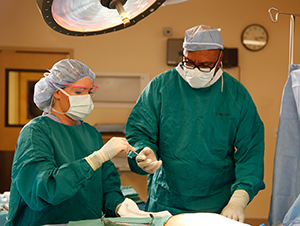Bile Duct Cancer: Surgery
When possible, surgery is the first choice to treat bile duct cancer. The goal is to remove all the cancer. Surgery is the only treatment that may cure people whose bile duct cancer has not spread.
In people whose cancer has spread, surgery can't cure the cancer. But it may be done to help ease symptoms. This is called palliative surgery. It can help ease pain and prevent complications.
It's important to know the goal and the risks and benefits of bile duct cancer surgery. Surgery in this part of your body is very complex. It's best to have it done by a team of doctors with a lot of experience.

Types of surgery for bile duct cancer
The type of surgery your doctor advises depends on where the cancer is and how far it has spread. Your doctor will also consider your age, overall health, and medical history. Here are some common surgical options for bile duct cancer:
-
Removal of the bile duct. A small tumor that's only in the bile duct close to where it first comes out of the liver, is called perihilar bile duct cancer. The entire bile duct might be removed to treat this cancer. The surgeon will then make a new connection to the small intestine. This lets the bile flow like it should. If the cancer has spread to nearby tissues, most often the liver and gallbladder, the surgeon may need to remove some of these tissues, too. Nearby lymph nodes may be taken out and checked for signs of cancer.
-
Partial hepatectomy. This is also called liver resection. The surgeon removes the part of the liver where the intrahepatic bile duct cancer is found. The cancer has to be in a bile duct that's inside the liver to do this. But it may also be done if cancer is in the hepatic duct very close to the liver. A large or small part of the liver may be removed. The surgeon may also remove some nearby normal tissue to be sure that all the cancer is taken out.
-
Whipple procedure. This major surgery is also called pancreaticoduodenectomy. If the bile duct cancer is in the part of the duct that's very close to the pancreas (distal bile duct cancer), you may need this surgery. The surgeon takes out the bile duct and the gallbladder, along with part of the pancreas, part of the stomach, and the first part of the small intestine.
-
Surgical biliary bypass. If the surgeon can’t fully remove the cancer, a bypass may be done. This helps lessen symptoms caused by the cancer. For instance, if the cancer is blocking the bile ducts and bile builds up, surgery can help ease the blockage. The surgeon can connect the bile duct to a piece of the small intestine. This creates a new pathway around the blockage. It lets the bile flow to your intestine for normal digestion. This is a type of palliative surgery. It doesn’t cure the cancer. But it can ease jaundice, itching, and other symptoms.
-
Liver transplant. Liver transplant may help some people if the cancer is in the liver. The liver and bile ducts are removed, and a donor liver is put in. This is a major, complex surgery. But in some people it may cure the cancer.
-
Stent or catheter placement. If the tumor is blocking the bile duct, a short, thin tube (called a stent) can be put in the duct to keep it open. Or a long, flexible tube (catheter) may be put in to drain bile into a bag outside of the body. A stent or catheter can be put in during surgery. This is a type of palliative surgery. It’s done to prevent or ease jaundice, pain, and other problems.
Questions to ask your doctor
Here are some questions you may want to ask your doctor about surgery for bile duct cancer:
-
What kind of surgery can I consider?
-
What option do you advise for me?
-
Which organs will you take out?
-
How many times have you done this surgery?
-
Are there any other treatment options besides surgery?
-
What will happen if I don't have the surgery?
-
Will surgery cure me?
-
How will I feel after surgery?
-
How long will I have to be in the hospital?
-
Will I need radiation and chemotherapy before or after surgery?
-
Where will the scars be? What will they look like?
-
How will my body work after surgery?
-
When can I get back to my normal activities?
-
How will surgery affect my diet?
-
What kind of follow-up care will I need after surgery?
-
Will I need other treatment after surgery?
The types of surgeries used to treat bile duct cancer are very complex, and you want a skilled surgeon with experience. Be sure you understand the goal of the surgery. It takes a long time to recover after some of these procedures. Talk with your doctor about the risks and benefits, as well as how surgery might affect your life.
What to expect after surgery
Surgery for bile duct cancer can have major side effects. Make sure to compare the risks of surgery to how surgery might help you. Possible side effects of surgery include:
-
Infection at the incision site
-
Poor wound healing
-
Pain
-
Blood clots
-
Leakage of bile or juices from the pancreas
-
Nausea or vomiting
-
Problems with digestion and nutrition
-
Liver problems
-
Complications from anesthesia
Online Medical Reviewer:
Jessica Gotwals RN BSN MPH
Online Medical Reviewer:
Melinda Murray Ratini DO
Online Medical Reviewer:
Todd Gersten MD
Date Last Reviewed:
4/1/2023
© 2025 The StayWell Company, LLC. All rights reserved. This information is not intended as a substitute for professional medical care. Always follow your healthcare provider's instructions.